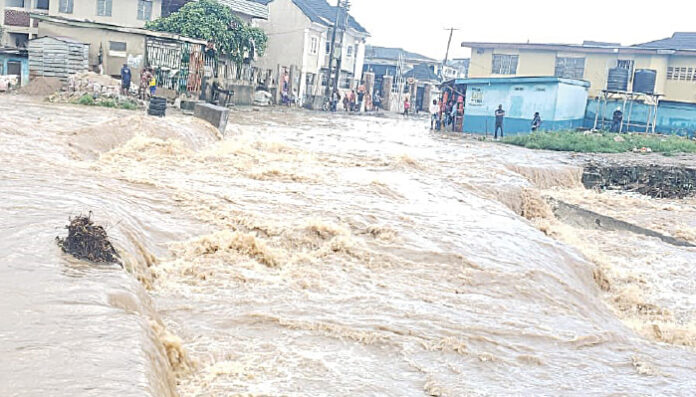Heavy Rainfall Coming, NEMA Warns 27 States
The National Emergency Management Agency advises communities at risk of flooding, especially those residing along waterways, to relocate to safer, higher ground in anticipation of the peak of the rainy season.
NEMA Director General, Zubaida Umar, re-affirmed the commitment of the agency to coordinate and provide necessary support towards efficient disaster management in the country.
A Thursday press release on NEMA’s X account said that NEMA has rapidly mobilised efforts to assess the damage.
It was titled, “Update on Flood Across the Country.”
The agency is also coordinating relief operations with State Emergency Management Agencies (SEMAs).
This highlights NEMA’s proactive stance and readiness to address the nationwide crisis.
It read, “The National Emergency Management Agency (NEMA) has responded to the recent flood incidents that devastated some communities across the country and commenced the assessment of the impacts with the various States Emergency Management Agencies (SEMAs) to provide timely and appropriate support to the affected persons.
“The timely response by NEMA to the flood incidents is in furtherance of the early preparations made by the agency in the deployment of search and rescue teams and the placement of all NEMA zonal and operation offices on alert.
“The agency has also commenced the deployment of relief items to complement efforts by the various state governments to provide succour to persons affected by the floods.”
NEMA, in its statement, added that it would keep raising awareness nationwide about solid waste management to encourage clearing blocked drainages.
“Furthermore, NEMA shall continue with public sensitisation as well as grassroots awareness through advocacies and workshops on solid waste management to raise public consciousness on the clearance of blocked drainages and waterways.
“So far, based on statistics from the NEMA Emergency Operations Centre established for the flood monitoring and coordination of resource deployment, 27 states have been impacted, with a total of 227, 494 persons affected and 32,837 houses damaged, as well as 16,488 hectares of farmlands with crops also damaged,” it added.
The NEMA boss urges SEMAs and community leaders to be prepared for rapid flood response and reassures farmers not to panic about the temporary dry spell, as it will end soon according to NiMet’s predictions.
“Umar reiterates that communities at risk of flooding and those living along waterways should relocate to safer, higher grounds ahead of the peak of the rainy season.
“Furthermore, she urges all stakeholders, especially SEMAs and community leaders, to be ready to activate, at short notice, plans and preparations for floods with the increasing incidents in some parts of the country.
“In a related development, the Director General of NEMA has advised farmers not to panic over the temporary dry season being experienced in some states, noting that the situation will soon be over as contained in the seasonal climate predictions released earlier in the year by the Nigerian Meteorological Agency (NiMet),” it concluded.
Flooding in Nigeria is a recurrent and severe issue, exacerbated by factors such as seasonal rains, poor drainage infrastructure, and deforestation.
The country experiences significant flooding during the rainy season, particularly in low-lying areas and regions near rivers and coastal zones.
Urbanisation and inadequate waste management often lead to blocked drainages, worsening the impact of floods.
In recent years, climate change has intensified these challenges, increasing the frequency and severity of flooding events.
The consequences are far-reaching, affecting millions of people through displacement, damage to homes and infrastructure, and disruptions to agriculture and livelihoods.
Efforts to manage and mitigate flooding include improved infrastructure, early warning systems, and public awareness campaigns.





